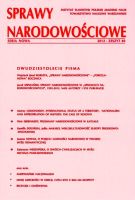International status of a territory, nationalism and appropriation of history: the case of Kosovo
International status of a territory, nationalism and appropriation of history: the case of Kosovo
Author(s): Matvey LomonosowSubject(s): Cultural Essay, Political Essay, Societal Essay
Published by: Instytut Slawistyki Polskiej Akademii Nauk
Keywords: Kosovo; territory; nationalism; appropriation of history
Summary/Abstract: The issue of how legal arrangements pertaining to the international status of a political or administrative unit can influence the construction of the national identity is rarely addressed in the existing scholarship on ethnicity, nation and nationalism. Classical studies imply that nationalistically-prone political and cultural elites continuously strive to assemble all members of an alleged “nation” into one political unit. This, in turn, causes struggle for autonomy, independence, irredentism, secession, or, in the case of pan-nationalism, territorial expansion. It is also presupposed that real (if it can be the case), conceived, or constructed common ancestry of the members of a “nation” motivates nationalists to demand elevation of the nation’s status in the international arena, i.e. the recognition of autonomy and independence. However, the relationship between nation-building by means of constructed history and existing international personality is more complex. It can be the reverse. As the Kosovo case reveals, sometimes the existing international status of an administrative unit built upon ethnic principle determines the nation-building process, namely its historical side. Since 1945, the views of Kosovar elites regarding the ethnic origins of their constituents varied according to the political status of the region. As the later was evolving, Kosovar intellectuals and politicians differently saw ethnic roots of Kosovar Albanians. At first they considered this issue unimportant, but later “revealed” all-Albanian Illyrian (independently of tribal groups) roots and finally embraced Dardanian provenance.
Journal: Sprawy Narodowościowe
- Issue Year: 2012
- Issue No: 40
- Page Range: 45-54
- Page Count: 10
- Language: English

